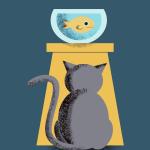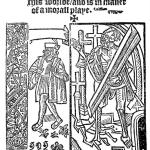PROVERBS 29:1
This proverb deals with a man with a hardened neck. The combination of terms is often translated as “stiffnecked” and typically described Israel. They display their stiff necks when they erect the golden calf (Exodus 32:9; 33:3, 5; 34:9), and their stiffnecked response to the prophets led to the exile (2 Kings 17:14; Nehemiah 9:17). Moses exhorted them not to stiffen their necks but instead to circumcise the foreskin of the heart (Deuteronomy 10:16).
Proverbs 29:1a is a fair summary of the history of Israel from exodus to exile: Israel was the man who hardened his neck despite much correction, and he was broken. According to Stephen, even long after the Jews had not learned their lesson; in stoning him, they were showing themselves to be “stiff-necked and uncircumcised in heart and ears” who “always resist the Holy Spirit. You are doing just as your fathers did” (Acts 7:51).
Israel’s stiffnecked conduct following the exodus was doubly ironic. Israel had been placed under “stiff” or “hard” labor in Egypt (Exodus 1:14; 6:9); Yahweh delivered them from their hard labor but they became hardened afterward. Further, Pharaoh was the one who initially hardened his heart against God (Exodus 7:3). In stiffening their necks to the Lord, Israel was acting the part of Pharaoh rather than the part of those who had been redeemed from Pharaoh. Stiffnecked behavior was a subtle way of returning to Egypt.
For those who listen to reproof, the Lord promises to break the yoke from the neck. Those who refuse to listen get broken themselves. Pharaoh was stiffnecked, and was broken. Israel became stiffnecked, and got broke. Eli heard much reproof and instead of repenting became “fat” ( kabod , like the heart of Pharaoh), and he toppled off his seat and broke his stiff neck. Hardening against reproof and correction only makes a man and a neck brittle, liable to be broken.
According to this proverb, the shattering of the stiffnecked can happen “suddenly” (the word properly means “in the blink of an eye”; cf. the other uses in Proverbs 6:15; Isaiah 29:5; 30:13). This is pastorally and personally helpful. Sometimes we reprove and reprove, rebuke and correct, and nothing at all seems to happen. The person we instruct just keeps going on in his or her proud and rebellious fashion, seems to be getting away with it. There is no evidence of a gradual decline. But then, without warning, there’s a crisis, and his or her whole life shatters in a day. God’s word does not return void, though its effect may be invisible for a long time. It is the Word of the God who brings blessings and calamity, and it will do His bidding.
PROVERBS 29:2
This verse is written in a very symmetrical fashion. The Hebrew, woodenly translated, is:
In the increasing of the righteous rejoice the people
But in the dominion of the wicked mourn the people.
Two different words are used for “rule.” The first, rabah , basically means “increase” or “multiply.” It is what the Lord commands the fish, birds, and men to do in Genesis 1 (vv. 22, 28) and it is what Israel does in the years before the exodus. The word might possibly mean that the righteous are increasing in stature, becoming great, but the more normal use is numerical – the righteous are multiplying and filling the land. If they are filling the land, then they are also presumable increasing in authority and influence (as the AV translation suggests).
The word for “dominion” in the second line of the proverb is mashal , which is what the sun and moon are to do over the day and night (Genesis 1:18). The word also puns on one of the words for parable or proverb (Proverbs 1:1, 6; 10:1; 25:1). Kings rule by wisdom, and wisdom is expressed in parables and proverbs, in shrewd rhetoric and speech. Here in 29:2, the word has a negative connotation. The rule of the wicked is also the false wisdom of the wicked, their cunning.
The use of two prominent “creation” words is noteworthy. Human beings are supposed to multiply and increase, and there is a kind of increase that brings joy and pleasure to a people, the increase of the righteous. Like the sun and moon, human beings are supposed to rule, to exercise mashal , over the day and night; but there is a kind of rule that brings no light, offers no warmth, healing, or illumination, that brings only darkness and a night of mourning.
According to the proverb, different sorts of rule bring different sorts of responses. When the righteous multiple, rejoicing is the result; when the righteous rule, the people eat, drink, and rejoice. Rejoice is samach , typically a liturgical term (Leviticus 12:40; Deuteronomy 12:7, 12, 18; 14:26; 16:11, 14). Rejoicing is typically “before Yahweh.”
Sighing or mourning is what Israel does when they are in bondage in Egypt (Exodus 2:23), when Jerusalem lies in ruins (Lamentations 1:4, 8, 11). But sighing is also done before Yahweh, and can be a mark of faithful lament (cf. Ezekiel 9:4). When Israel sighs in Egypt, Yahweh hears and sends Moses along. When the wicked have dominion, and the people sigh, there is hope that there is a God in heaven who hears and answers.
PROVERBS 29:3
This proverb is a Prodigal Son story in miniature. The prodigal did not love wisdom or his father, and instead spent his substance on riotous living and prostitutes (Luke 15:30), until he came to his senses and returned to his father. This proverb is also a sum of the whole book of Proverbs in miniature. “Wisdom” is a lady, and the man who loves her makes his father rejoice ( samach again). He chooses a good bride. On the other hand, there are sons who keep company with a harlot, who go after the Whore Folly, and lose everything. That, in an acorn shell, is the book of Proverbs.
The word for “keep company” is more often used for “feeding” or “pasturing” flocks. Perhaps the proverb implies that the son is a pimp, herding his whores. But the word shares the same consonants as the Hebrew word for “friend, companion.” The man is wasting his substance making friends with prostitutes.
No wonder Jesus was such an offense. He became friends with tax gatherers and sinners, had a following among the prostitutes (Matthew 21:32), and announced that harlots would enter the kingdom of heaven prior to the entry of the righteous. Jesus didn’t stop hanging around with prostitutes after He ascended. He sticks with us, often “shepherding” a harlot bride. He even destroys His substance in company with sinners.
Jesus didn’t look like a son who loved Wisdom; He looked like a prodigal. How could His Father rejoice in Him? Yet He claimed an intimate, unique relationship with His Father, and the Father declared from heaven that Jesus was His beloved Son. Jesus is Wisdom, and he loves Wisdom, and so makes His Father glad. But the Wisdom of God looks like folly to men; the Son who pursues Lady Wisdom can look like a hound on the scent. He isn’t, and so He gladdens His Father. But His wisdom is the crooked wisdom of the cross.















